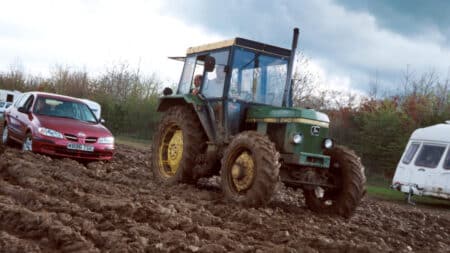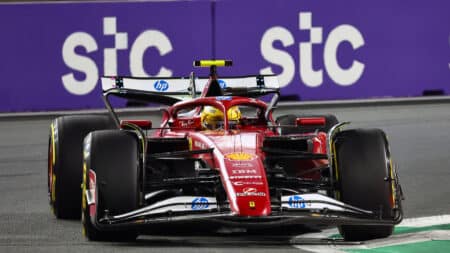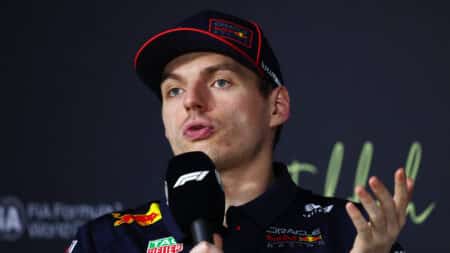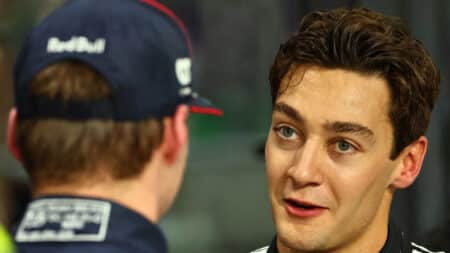“Can we talk later on this afternoon?” he says. “I’m a bit tied up right now, working on a friend’s Morris 1000 Traveller. Is that OK?”

Surely a Morris Traveller has never been fettled by such experienced hands as those of Kerry Adams, former mechanic at Williams, Brabham and McLaren. Kerry left his native New Zealand to work with Chris Amon and Derek Bell in the Tasman Series in Australia where he met some of the Formula 1 guys who encouraged him to make the trip to Europe.
“I went to live in Modena in 1970 and it was there I met Frank Williams who was putting together a team with De Tomaso and he asked me to work for him, to do some Formula 1 races. These were the very early days with Piers Courage, and Frank was always short of money. All the stories are true – like when he couldn’t pay the mechanics’ wages and let us go through his wardrobe and take some of his Turnbull & Asser shirts and handmade shoes. There was never much money around in those days…

Adams (left) with Piers Courage and Frank Williams at Spa, 1970
“I was there for two years, working with Henri Pescarolo after Piers died at Zandvoort, and then at the end of 1971 Herbie Blash talked me and Bob Dance into going to Brabham. I was at Brands Hatch, this little chap jumped over the pit counter, and Herbie introduced me to him as Bernie Ecclestone. I didn’t have a clue who he was. At the beginning I worked with Graham Hill, he was a bit of a fuddy duddy, in the nicest possible way, and he’d fuss over the roll bars, change them by an eighth, or a sixteenth of an inch, never mind how the car was handling.
“They were good times, we were the first people employed by Bernie, though Herbie then left on day one – he couldn’t get on with Ron Tauranac. Bernie, though, was one of the best employers I ever worked for. Despite what people say about his ruthlessness, whatever you wanted, you would get it, if it was going to make the car more competitive, never any question about that. If you couldn’t get it, he’d organise it. That way he avoided any arguments because we got everything we wanted and had nothing to complain about.
“In ’73 Gordon Murray produced the BT42. Carlos Reutemann was very quick the first time we raced the car, at the Spanish Grand Prix in Barcelona, but the driveshaft broke. Carlos was a bit moody, not an extrovert, not very communicative, but a very good driver. There were just two of us on his car, myself and Derrick Walker, and we were much closer to the driver in those days. Feedback was very important before all the computers and telemetry came along.”

Reutemann leads Denny Hulme at Mosport, 1972
From Brabham Kerry moved to McLaren, winning the World Championship with Emerson Fittipaldi in 1974 after a season-long battle with Ferrari’s Clay Regazzoni.
“Having been born in New Zealand I’d always wanted to work at McLaren. It was just the best training ground for a mechanic at that time, and it was the pinnacle for me. We worked our butts off but we learned a lot, we got results, and if you didn’t know how to do something then someone would teach you.
“We ran three cars in ’74: Emerson, Denny Hulme and a third car for Mike Hailwood on a Yardley contract. It was a great year, with big budgets from Texaco and Marlboro, and at the last race at Watkins Glen it was either Emerson or Regazzoni who would win the championship. We didn’t win the race but we did get McLaren’s first F1 championship.”

Times have changed dramatically for a Grand Prix mechanic but Kerry says the different eras had different challenges.
“Nowadays they get holidays in August,” he laughs, “but then we didn’t do as many races in the year. It’s less hands-on these days, you might be working on the left front corner and nothing else, so I’m not sure that’s using all your mechanical knowledge. We did everything, we were always running out of hours, and now I think the chances of a mistake or a failure are diminished because there are so many more people on the cars. In the end it was the travelling that got to me, you’d get back from a race then you’d be off testing because there were no test teams back then. But we had a lot of fun and I guess they still do today.”
Having left the pitlane behind, Kerry established the highly respected Adams McCall Engineering business which restores, prepares and runs historic racing cars for the world’s top collectors and owners. In 2011 he ran Bernie Ecclestone’s Ferrari 375 which was so memorably demonstrated by Fernando Alonso just before the start of the British Grand Prix at Silverstone.

“I found myself working on some of the cars I’d worked on in period, like Count Rossi’s Brabhams, so it all came full circle, but now I’ve handed over to a younger person. For most mechanics, however, it’s in your DNA so you never really retire, you just slow down a bit.”
The Morris Traveller shouldn’t be a problem for such an incredibly experienced man – though I seem to recall that carpentry skills may be involved along the way.










